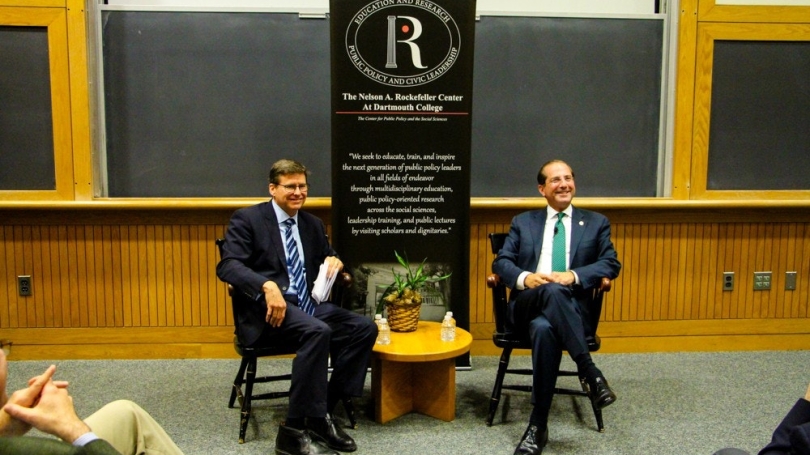
- Public Policy
- Leadership
- Funding
- News & Events
- About the Center
Back to Top Nav
Back to Top Nav
Back to Top Nav
Back to Top Nav
On Friday, May 3, 2019, Secretary of Health and Human Services Alex Azar ’88 spoke at a fireside chat moderated by Professor Charles Wheelan ’88. The event, fittingly entitled “A Fireside Chat with Health and Human Services Secretary Alex Azar,” was targeted mainly at students. The following morning on Saturday, May 4, Secretary Azar attended a student breakfast, at which he spoke with a group of approximately 30 graduate and undergraduate students. At both events, he largely focused on his career path, his priorities as HHS Secretary, and his advice for students.
Students at the breakfast represented a wide variety of interests and backgrounds, from healthcare management to practicing medicine to policymaking. This range was reflected in the diversity of their questions, which concerned policy issues like HIV prevention, climate change and epidemic control, the opioid epidemic, e-cigarettes, and outcome-based healthcare, as well as requests for career advice.
Though he is “cautious of career advice people give about their own paths,” Secretary Azar advised students to view each step in their career path as an opportunity to develop their “personal brand.”
Secretary Azar’s own career trajectory belies his love for public service and government. During his time at Dartmouth, he served as the Chairman of the College Republicans and ran Pete DuPont’s campaign in New Hampshire. After graduation, he attended law school at Yale, where he was a part of the conservative law group The Federalist Society.
During the 2000 election, Secretary Azar — then a partner in a private law firm — remained active in public life as the head of Lawyers for Bush, an organization that became newly important after the Bush campaign requested a recount of ballots. Secretary Azar then served as General Counsel for the Department of Health and Human Services. He was later appointed Deputy Secretary of the agency.
During his time in the George W. Bush Administration, Secretary Azar often found himself working with career service employees who did not share his values. In doing so, he learned a valuable lesson about leadership: effective leaders leverage their “power to convene” rather than their power to decide. To maintain cooperation and buy-in, he worked to align priorities and emphasize shared goals. He also sought to monitor rather than mandate, granting his subordinates considerable leeway in project implementation. He has found these best practices to be effective in his current role as well.
In 2007, Secretary Azar transitioned back to the private sector, holding a senior position at pharmaceutical company Eli Lilly. Though he has faced criticism for having worked in the industry that he now regulates, he considers this prior experience to be valuable. Now, he knows what “integrity looks like in the [pharmaceutical] field,” he explained.
One frustration that he has had with government work, as opposed to work in the private sector, is the added pressure of politics. He described DC as a “toxic” environment in which people approach policy differences as moral offenses. Further, the duties of public office come with a perceived need to translate political momentum into results. His office deals with far-reaching, complex issues that are unsolvable within the time periods dictated by the public’s attention span.
That being said, having had prior experience working in HHS, he was ready to hit the ground running when he assumed the position of Secretary. His present policy priorities include addressing the opioid crisis, transitioning to outcome-based healthcare, reducing prescription drug prices, and cracking down on minors’ e-cigarette usage. During the fireside chat and the student breakfast, he walked listeners through his rationale for granting these issues priority status, progress made, and challenges to implementation.
Written by Eliza Jane Schaeffer ’20, Rockefeller Center Student Program Assistant for Public Programs